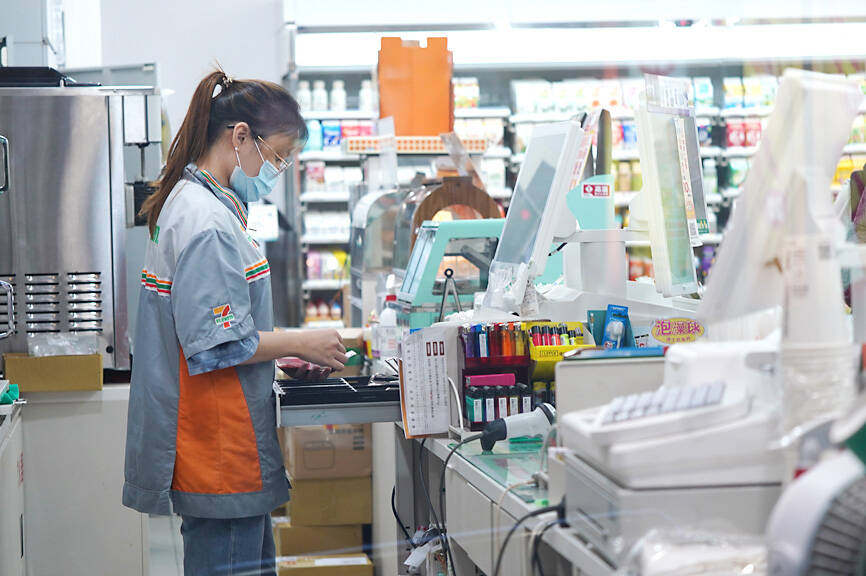Taiwan’s median wage last year rose 2.37 percent to NT$518,000 (US$16,570), the biggest increase in four years, as GDP growth in the previous year allowed firms to boost pay and issue more bonuses, the Directorate-General of Budget, Accounting and Statistics (DGBAS) said yesterday
The data suggest that the 4.09 million workers in the industrial and service sectors had annual pay below the benchmark, as the number of workers across sectors was 8.17 million, the DGBAS said.
“The increase in median wage last year had much to do with a GDP growth of 6.62 percent in 2021” on the back of COVID-19 bonuses, Census Department Deputy Director Chen Hui-hsin (陳惠欣) said.

Photo: CNA
The pace would lessen this year, as local firms are taking a hit from a global slowdown induced by sharp inflation and monetary tightening, Chen said.
Median wages were highest at electricity and gas suppliers at NT$1.09 million, followed by NT$1.04 million at financial and insurance companies, as well as video content creators and information service providers at NT$754,000, the data showed.
Non-school educational facilities offered the lowest median wage of NT$360,000, followed by alternative service providers at NT$361,000, and hotels and restaurants at NT$381,000, the DGBAS said.
The median wage is highest in Hsinchu City at NT$821,000, as it is home to the headquarters of major high-tech firms, it said.
Taipei was second with a median annual wage of NT$701,000, with major financial and insurance companies having their headquarters and flagship branches in the capital, Chen said.
Penghu and Changhua counties had the lowest median wages of NT$428,000 and NT$429,000 respectively due to a lack of well-paid job opportunities, the DGBAS said.
Male workers had a higher median wage of NT$557,000 compared with females at NT$481,000, it said.
Workers with graduate degrees reported a median wage of NT$1.04 million, while those with at best a junior-high school education had the lowest median wage of NT$413,000, it said.
Workers aged 40 and 49 had the highest median wage of NT$589,000, while employees under 25 had the lowest of NT$362,000, it said.

Hon Hai Precision Industry Co (鴻海精密) yesterday said that its research institute has launched its first advanced artificial intelligence (AI) large language model (LLM) using traditional Chinese, with technology assistance from Nvidia Corp. Hon Hai, also known as Foxconn Technology Group (富士康科技集團), said the LLM, FoxBrain, is expected to improve its data analysis capabilities for smart manufacturing, and electric vehicle and smart city development. An LLM is a type of AI trained on vast amounts of text data and uses deep learning techniques, particularly neural networks, to process and generate language. They are essential for building and improving AI-powered servers. Nvidia provided assistance

DOMESTIC SUPPLY: The probe comes as Donald Trump has called for the repeal of the US$52.7 billion CHIPS and Science Act, which the US Congress passed in 2022 The Office of the US Trade Representative is to hold a hearing tomorrow into older Chinese-made “legacy” semiconductors that could heap more US tariffs on chips from China that power everyday goods from cars to washing machines to telecoms equipment. The probe, which began during former US president Joe Biden’s tenure in December last year, aims to protect US and other semiconductor producers from China’s massive state-driven buildup of domestic chip supply. A 50 percent US tariff on Chinese semiconductors began on Jan. 1. Legacy chips use older manufacturing processes introduced more than a decade ago and are often far simpler than

STILL HOPEFUL: Delayed payment of NT$5.35 billion from an Indian server client sent its earnings plunging last year, but the firm expects a gradual pickup ahead Asustek Computer Inc (華碩), the world’s No. 5 PC vendor, yesterday reported an 87 percent slump in net profit for last year, dragged by a massive overdue payment from an Indian cloud service provider. The Indian customer has delayed payment totaling NT$5.35 billion (US$162.7 million), Asustek chief financial officer Nick Wu (吳長榮) told an online earnings conference. Asustek shipped servers to India between April and June last year. The customer told Asustek that it is launching multiple fundraising projects and expected to repay the debt in the short term, Wu said. The Indian customer accounted for less than 10 percent to Asustek’s

Gasoline and diesel prices this week are to decrease NT$0.5 and NT$1 per liter respectively as international crude prices continued to fall last week, CPC Corp, Taiwan (CPC, 台灣中油) and Formosa Petrochemical Corp (台塑石化) said yesterday. Effective today, gasoline prices at CPC and Formosa stations are to decrease to NT$29.2, NT$30.7 and NT$32.7 per liter for 92, 95 and 98-octane unleaded gasoline respectively, while premium diesel is to cost NT$27.9 per liter at CPC stations and NT$27.7 at Formosa pumps, the companies said in separate statements. Global crude oil prices dropped last week after the eight OPEC+ members said they would